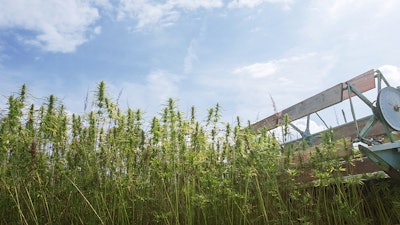
Ohio is one of 21 states in the nation where intoxicating hemp products are legal and completely unregulated, and that’s a cause for concern among the state’s policymakers and public health officials, according to a new report.
Researchers at Ohio State University’s Drug Enforcement Policy Center (DEPC) released the report on Nov. 12. It outlines those concerns—from youth use to consumer safety—and offers considerations for regulating intoxicating hemp products in the Buckeye State.
The report comes amid ongoing discussions in the General Assembly to ban, restrict or regulate these products, such as delta-8 THC gummies, with a handful of pending bills still on the table this legislative session.
“The proliferation of these products in many retail outlets has led to concerns about their safety, quality, and marketing among policymakers and public health experts,” DEPC Administrative Director Jana Hrdinová, the report’s author, wrote. DEPC Executive Director Douglas A. Berman, Senior Research Associate Maria M. Orsini and Research Associate Dexter Ridgway also contributed to the report.
“Many states have taken steps under state law to regulate intoxicating hemp products,” Hrdinová wrote. “According to a recent Reason Foundation report, Ohio is currently among a minority of states with minimal or no regulations on these products, though several bills are currently pending in the Ohio General Assembly.”
Most recently in Ohio, state Sen. Steve Huffman, R-Tipp City, introduced Senate Bill 326 on Nov. 6 to define intoxicating hemp products and criminalize their sale.
The DEPC outlines three other bills in the report:
- The Senate passed an amended version of House Bill 86 in December 2023—following the House’s June 2023 passage—that would redefine hemp to close “several loopholes” that “unintentionally allow for the sale of hemp products with additional THC compounds that have an intoxicating effect.” The House hasn’t approved the Senate’s amendments.
- Sens. Kirk Schuring, R-Canton, and Huffman introduced Senate Bill 278 in May to prohibit “adult-use hemp products” from being sold to anyone younger than 21. This bill was referred to the General Government Committee in June.
- Rep. Sara Carruthers, R-Hamilton, introduced House Bill 642 in July. It intends to require the Ohio Director of Agriculture to study and adopt recommendations to regulate “adult-use hemp products.” The bill was referred to the Finance Committee on Nov. 12.
These bills omitted numerous policy options that currently exist in the state’s regulated adult-use cannabis market. According to the DEPC, none of the four bills address child-resistant packaging, licensed laboratory testing or excise taxes. And only one bill addresses advertising restrictions for minors.
“Unlike marijuana products that are restricted to adults who are 21 or older and that can only be sold in licensed dispensaries, intoxicating hemp products [in Ohio] can be sold at any store and do not carry any age restrictions,” Hrdinová wrote. “Additionally, because they are not covered by any of the adult-use marijuana regulations, there are no restrictions on how they are packaged, whether they are designed to appeal to children, or whether they are marketed specifically to children and adolescents.”
The Ohio bills remain pending as the U.S. hemp-derived cannabinoid market (including nonintoxicating CBD) is conservatively estimated to be $28.4 billion, according to Whitney Economics’ “2023 National Cannabinoid Report,” Cannabis Business Times reported in April.
The proliferation of intoxicating hemp products in interstate commerce follows the 2018 Farm Bill, which federally defined hemp as having no more than 0.3% delta-9 THC on a dry-weight basis. The U.S. Department of Agriculture requires the THC potency to be determined during a pre-harvest test within a 30-day window of harvest time.
In other words, there is no federal testing requirement for hemp derivatives found in finished products, leading to the recent explosion in intoxicating edibles and beverages that have resulted in a scrambling effort by individual states to incorporate their own laws and regulations.
“Some of the most common and prominent concerns include use by youth and children’s accidental exposure, consumer safety, and balancing interests of the hemp and adult-use marijuana industry,” Hrdinová wrote. “Ohio does not have any laws or regulations restricting access to intoxicating hemp products to teens and young adults.”
According to a September 2024 report from the Reason Foundation, 15 states fully prohibit intoxicating hemp products: Colorado, Delaware, Hawaii, Idaho, Iowa, Mississippi, Montana, Nevada, New York, North Dakota, Rhode Island, South Dakota, Utah, Virginia and Washington.
Meanwhile, other states regulate intoxicating hemp products as consumer goods or as cannabis. Others have placed bans on synthesized hemp cannabinoids or on individual hemp cannabinoids, such as delta-8 or delta-10 THC.
These regulations have an impact on youth use. For example, high school seniors are more likely to use delta-8 THC in states without cannabis legalization or existing delta-8 regulations, according to the 2023 Monitoring the Future survey from the National Institute on Drug Abuse.
“The unfettered access is problematic in part because any psychoactive THC substance, whether delta-8 or delta-9, can negatively affect brain development in adolescents and impact other aspects of their lives,” Hrdinová wrote. “These concerns have been emphasized by Ohio Gov. Mike DeWine in his advocacy for legislation in Ohio to address intoxicating hemp products.”
The DEPC also highlights the differences in Ohio’s regulatory scheme for adult-use cannabis and hemp, from high license fees and taxes for cannabis to requirements for testing, labeling, packaging, advertising, security, and track-and-trace systems.
The costs of operating in the regulated cannabis space have created an uneven playing field when going up against intoxicating hemp products that remain unregulated in Ohio, Hrdinová wrote.
“Unless the Ohio Legislature chooses to completely ban intoxicating hemp products, which has been an approach taken by a number of states and has been proposed in some bills, Ohio legislators should consider the range of regulatory realities … as [they consider] ways to balance the interests of these two competing industries,” she wrote.
The following are the regulatory options in four policy arenas provided in the DEPC report:
Regulatory Options to Prevent Use by Youth and Children’s Accidental Exposure
- Adopt a 21-year-old age limit requirement for purchases of intoxicating hemp products
- Adopt child-resistant packaging requirements developed for Ohio’s adult-use cannabis market
- Adopt regulations prohibiting advertising to minors developed for Ohio’s adult-use cannabis market
- Adopt location restrictions developed for Ohio’s adult-use cannabis market for intoxicating hemp product retailers with respect to schools, libraries, parks and playgrounds
Regulatory Options to Protect Consumer Safety
- Adopt manufacturing and product safety standards
- Establish resting regulations for finished intoxicating hemp products at the wholesale level
- Adopt labeling regulations developed for Ohio’s adult-use cannabis market
Regulatory Options to Balance Interests of the Hemp and Adult-Use Cannabis Industries
- Charge the same excise tax on intoxicating hemp-infused products
- Regulate retail outlets
- Establish clear penalties for noncompliance
Administrative Regulatory Considerations
- Define what constitutes an intoxicating hemp product
- Adopt regulations for all products sold in the state of Ohio irrespective of where they are produced
- Collect data and provide education



























